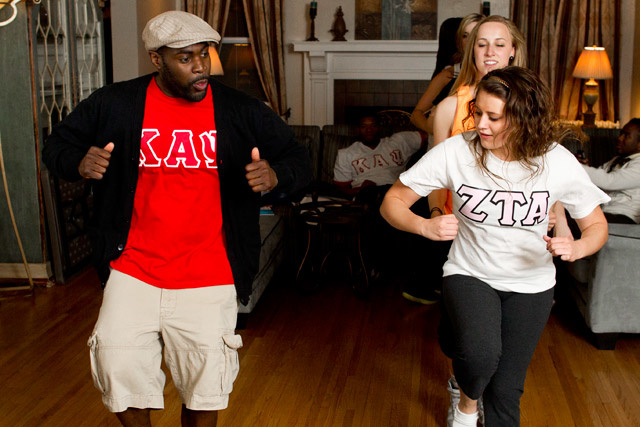Each spring, the University of Iowa Greek-letter community spends a week coming together around social events, community service and philanthropy efforts, and educational programming.
Greek Week is a celebration of and for all 40 of Iowa’s sororities and fraternities. And this year, the community is shining a spotlight on its growing number of culturally based groups as it wraps up the week with the NPHC Stroll Competition.
The show is at 7 p.m., Saturday, April 21, in the Main Lounge of the Iowa Memorial Union. Admission is $7 for students, $9 for nonstudents. (There’s a $2 discount on admission with the donation of a canned good item.)
Strolling is a synchronized, rhythmic dance, typically performed in a line. Teams put together story lines, costumes, music, and choreography to create a complete routine. Like stepping, a similar dance form, strolling is a longstanding tradition among culturally based Greek-letter organizations.
The UI’s five historically African-American sororities and fraternities, all of which are affiliated with National Pan-Hellenic Council (NPHC), have held a stroll competition on campus for the last three years.

This will be the first time the event is a part of Greek Week. And this year, strollers will come from every corner of the Greek community.
Iowa’s Greek chapters fall into four councils: the NPHC (historically African-American sororities and fraternities), the Multicultural Greek Council (other culturally based fraternities and sororities), and the two “traditional” councils: the Interfraternity Council (fraternities) and the Panhellenic Council (sororities).
During Greek Week, chapters from different councils team up to compete in events together.
“I think Stroll is going to be a really good unity experience. We’re teaching each other our traditions, and that’s been really fun,” says Sri Chockalingam, a junior from Rockford, Ill., and current president of the Multicultural Greek Council. “There’s been some great collaboration across the councils.”
In addition to seeing stroll teams strut their stuff on stage, audience members at the stroll will learn about the history and evolution of strolling and stepping from emcee Rick Daniels, a motivational speaker and the leadership advisor for Greeks at the University of Wisconsin-Whitewater.
The University of Iowa has a long history with culturally based sororities and fraternities, says Kelly Jo Karnes, associate director of the Center for Student Involvement & Leadership, and advisor for UI Fraternity & Sorority Life.
“Kappa Alpha Psi, a historically African-American fraternity, was started in 1911 at Indiana University. In 1914, the third chapter nationally of their organization started at Iowa. That’s a huge, long history,” Karnes says.
Today, the UI has five NPHC chapters (and a sixth in the process of starting up), two historically Asian chapters, two historically Latino/a chapters, and a gay men’s progressive fraternity.
Learn more about UI Fraternity & Sorority Life at www.uiowafsl.com.
“Historically, these types of organizations were founded because other groups were exclusive to certain folks, often based on race,” Karnes says.
That’s not the case any more. Chapters in every council welcome students of all backgrounds.
But students who join a culturally based sorority or fraternity say they value their group’s rich history of promoting and supporting diversity on campus along with the sense of solidarity and belonging found in any Greek sister- or brotherhood.
“In Iowa, where our minority populations are small, a culturally based sorority or fraternity can be a great opportunity for students to connect with other students who look like them, or have similar experiences as them. Or where people from different backgrounds can learn about a culture that’s different from their own,” Karnes says. “Either way, the biggest benefit of joining any Greek organization is that it becomes an immediate family, an immediate sense of home away from home. Greek Week is a time to celebrate that.”